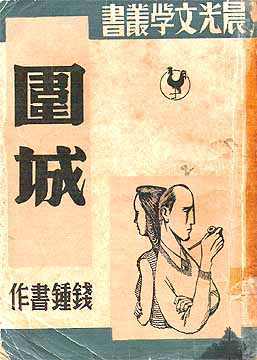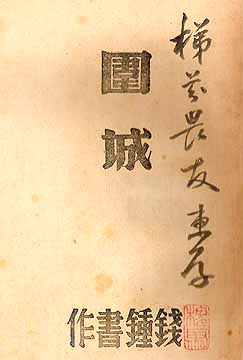Besieged Fortress - Part 1
In researching material on mendicants in Shanghai, I came across this article in the Shanghai Star archives. The principal subject is about the foreign educational credentials of job applicants:
THE renowned novel "Besieged Fortress" by Qian Zhongshu has created a popular name for fake diplomas - "Kleiton University".
The hero, Fang Hongjian, goes to Europe for study but fails to get a diploma. To gain fame, he buys a fake diploma from the non-existent "American Kleiton University" before coming back to China.
However, such diplomas issued by foreign universities have attracted quite a lot Chinese who are eager to seem to have a better education background.
In China, the Overseas Study Service Centre under the Ministry of Education is the only official organization to authenticate the degrees of foreign universities. However, according to Shao Wei, vice-director of the centre, between 25 per cent and 30 per cent of foreign degrees fail to be authenticated for various reasons every year.
Some proposers use fake degrees provided by non-existent universities; some hold valid degrees but they never studied at the universities. More people go to foreign universities or educational institutes through education agents, but they do not finish their studies or their thesis, so their study results can't be proved by formal report cards.
I was more intrigued in the invocation of the name Qian Zhoungshu (錢 鐘 書 ) and his novel "Besieged Fortress" (圍 城). As it turns out, I have a copy of this novel on my bookshelf here. This copy is the first edition that was published in May of 1947 in Shanghai and the inside page contains an inscription from the author to my father.


Qian was a few years older than my father. Although they never had a formal tutor-student relationship, my father told me that he had the habit of dropping in on Qian to 'talk shop' in Shanghai. Even after my father moved to Hong Kong in 1949, they still maintained correspondence.
Among the stories my father told me about Qian was his contempt for T.S. Eliot, whose name was translated by Qian as
愛 利 惡 德, which means 'love to make money and hate morality.'
"Besieged Fortress" is the one and only popular work of Qian. It is a cynical look at small-time academia, and it was really completely beneath the station of someone like Qian to have written it. That novel was popularized further through a television serialization in 1990.
In an essay titled "Chinese Poetry and Chinese Painting", Qian wrote:
If we wish both to understand an artist or writer and to pass judgement upon him, we must first know the views of his contemporaries towards the kind of work he produced. Such views, expressive as they are of a type of contemporary artistic or literary vogue (fengqi), comprise the raw material for later histories of artistic or literary criticism. Artists create not only in terms of the particular social conditions wherein they find themselves situated but also within the constraints of particular artistic or literary vogues. These vogues influence their choice of subject, of genre and of style. They provide them with opportunities whilst serving at the same time to limit the scope of their work ... A particular vogue is a latent force within creativity, therefore. It provides the background to any work of creative endeavour, but is not necessarily clearly discernible within that work itself. Only by reading the theories believed in by an artistís contemporaries, observing their reactions to specific works and thus understanding both their criteria and their expectations, may we readily perceive the actual nature of the vogue within which a particular artist worked, just as we can only descry the configuration of the wind from the particles of dust it carries, from the billowing of the wheat fields it passes over or from the contours of the waves it drives before it.
Alas, this theory is totally wrong when applied to Qian's case, as his major works (set aside from "Besieged Fortress") would be mostly incomprehensible to his contemporaries (note: I will explain in a follow-up post). However, no matter what, Qian's legacy would still be defined by that one solo novel.
The impact of "Besieged Fortress" is more than just a good read or television program. Here is an essay on globalization and the 2000 presidential election in Taiwan (Taipei Times):
In my opinion, people's attitudes toward globalization are similar to what happens in City Besieged (圍 城) , a book written by Qian Zhongshu (錢 鐘 書 ). In Qian's story, people in the besieged city want to leave while those kept out want to get in. Likewise, some people in countries leading the globalization trend want to stop it, while people in developing countries cannot wait to join in. The only difference is that with globalization there is a third group of people, who are observing the direction of globalization, pondering what next step they should take.
What exactly is globalization? First, it is a vague idea. Some say it is a cultural phenomenon, best represented by the thriving of Disney and MacDonald's worldwide. In a sense, this is the weakest interpretation because root cultures are very difficult to change. That Chinese wear blue jeans and suits doesn't mean that Chinese culture is "globalized."
Some people consider globalization a political concept, referring to the decline of nation-states and their sovereignty and the emergence of super-states. The best example is the establishment of the European Union. Recently, the European Parliament adopted political sanctions against the new Austrian government because the leader of the Freedom Party, Joerg Haider, is a far-rightist sympathetic to the Nazis. As a superstate organization, the EU is "rudely" interfering the domestic affairs of a member country. This phenomenon is what some people call political globalization.
It is natural for most people to regard globalization as an economic concept, meaning a liberalization transcends state borders. In fact, it is a sociological concept. Walestein might have been the first sociologist to use the term. According to his definition, it is a multifaceted concept -- an expanding phenomenon in a certain period of history. He also said that "world system" has been a core issue in human history.
Globalization can be exemplified by four examples. First, an evening TV broadcast shown in Berlin's airport was produced in California and sent to Berlin because of the the relatively lower costs -- demonstrating that satellite and Internet technology has facilitated the global transfer of skilled labor.
Second, pro-democracy demonstrators in Tiananmen Square obtained information from the outside world via CNN and BBC, proof of the failure of the state to block the flow of telecommunication.
Third, many bicycles and shoes are designed with Taiwan technology, manufactured in China and exported to US and Europe. This shows the integration of labor, technology and markets on a global scale.
Fourth, penguins in South Pole die from industrial pollution produced in Europe.
However, the world economy is still at a stage of internationalization, rather than globalization. Although globalization has triggered much discussion world-wide, statistics show that the world is not as "globalized" as it was back in 1913 -- the first period of globalization according to Walestein.
One of the important indices in measuring the level of global integration is the so called "open-ness" -- the percentage of trade volume in gross domestic products of a country. For example, the openness level of Japan was about 30 percent in 1913; today it's less than 20 percent. In France and England it is 38 and 48 percent respectively, slightly higher than the 1913 figures.
As for direct overseas investment, the figures nowadays are generally less than those in 1913. In 1913, Holland's direct overseas investment was 82 percent of its GDP; now it's around 40 percent. England's was 65 percent while it's 25 percent now; a similar decrease has taken place in Germany. What's more, despite the dramatic decrease in travel costs and time, as well as border controls, global labor market integration is still less intensive than in the second half of 19th century.
Globalization has attracted both praise and condemnation, but so far we are not sure if this trend will sweep the world. Although it cannot be denied that economic globalization has brought many benefits to the world, such as the boost of productivity and the emergence of Asia's G7, more disadvantages could come along with it.
The first is the deepening income disparity resulting from the changes on employment and income structure. The German sociologist Sahsen said that in a globalized society, we only need two kinds of laborers: professionals such as computer programmers and ordinary workers such as restaurant waiters.
The interdependence between the two groups will grow and the job opportunities for people in between will decrease. This U-shaped structure of employment is prevailing worldwide -- people are equal on an unequal basis.
According to the the research published in Globalization and Conflicts by the Norwegian Technology University and the Oslo Peace Research Institute, the potential consequence of globalization has deepened income disparity, regional political instability, and even wars, caused by wrongful distribution of pollution. The development of globalization is similar to the story of Beseiged City. To embrace this irresistable trend, Taiwan should, on one hand take part in it and on the other, preserve its regional roots.
The slogan "think from the perspective of globalization, but act by the principle of regional needs" should be one of the concerns of our presidential candidates. Dear presidential candidates, what are your substantive plans for globalization?